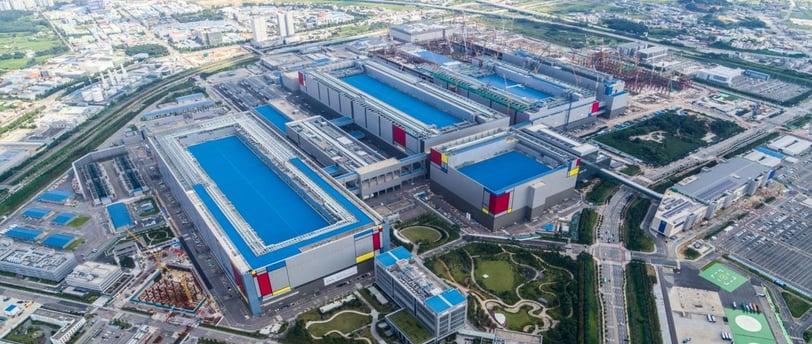Samsung's $230 Billion Investment in South Korea Will Create the Ultimate Nerdvana for Chip Enthusiasts!
South Korea is gearing up to forge a colossal, cutting-edge semiconductor megalopolis near Seoul, fueled by a whopping $230 billion investment from chip titan Samsung Electronics. This silicon sanctuary is on a mission to skyrocket South Korea's chip-fabricating prowess and dethrone Taiwan as the industry's top dog. With a 20-year completion roadmap, the project tackles global supply chain jitters while heeding the call for homegrown semiconductor ops from governments and tech giants alike.


An aerial view of Samsung Electronics' chip production plant at Pyeongtaek, South Korea on September 7, 2022.
South Korea asserts its intent to construct a gargantuan, state-of-the-art facility for the fabrication of silicon wafers in the vicinity of Seoul, fueled by an investment of approximately $230 billion from memory chip behemoth Samsung Electronics.
President Yoon Suk Yeol unveiled the ambitious blueprint on Wednesday, which was subsequently corroborated by the electronic titan.
“We will build the world’s largest new ‘high-tech system semiconductor cluster’ in the Seoul Metropolitan area based on large-scale private investment of almost 300 trillion Korean won,” he proclaimed.
“In addition, we will grow the ‘semiconductor mega cluster’ to the world’s largest in connection with the existing memory semiconductor manufacturing complexes.”
The government's official communique indicated that the silicon wafer hub would be situated in Gyeonggi province, an integral component of the Seoul Metropolitan area, with the comprehensive investment slated for completion within two decades.
To safeguard intellectual property, the nation will amend its Industrial Technology Protection Act, as per the statement, which remained tight-lipped on supplementary specifics.
In May of the previous year, Samsung (SSNLF) delineated a strategy to infuse over $350 billion into its enterprises and spawn tens of thousands of new employment opportunities through 2026. The primary focus would be on core sectors such as chipmaking and biopharmaceuticals.
The degree of overlap between the prior and freshly announced investments remains ambiguous.
Sanjeev Rana, a CLSA analyst, informed CNN that Samsung's financial commitments over the forthcoming twenty years seem to equate to an annual average of roughly 15 trillion won dedicated to its foundry or contract manufacturing operations—a figure akin to its present annual capital expenditure in that domain.
“This is in line with market expectations,” he asserted.
Samsung is renowned for its electronics division, which boasts highly sought-after smartphones and televisions. In recent times, the conglomerate has embraced its identity as a semiconductor supplier in light of worldwide shortages.
In the realm of cutting-edge computer chips, Samsung vies for dominance with Intel (INTC) and Taiwan's TSMC.
A staggering majority of the globe's advanced microchips originate from merely two locales: Taiwan and South Korea. Taiwan's industry is more expansive and preeminent, a status quo South Korea is eager to contest.
The consolidation of such critical chip production in a mere two regions has elicited apprehension concerning the stability of the global supply chain, particularly as both South Korea and Taiwan face military threats from their neighbors, North Korea and China, respectively.
Over recent years, key economies have voiced trepidation over potential loss of access to semiconductors, especially amid escalating political and economic tension between China and the United States.
Various governments, including Washington, and prominent corporations like Apple, have implored semiconductor firms to domesticate their operations.

